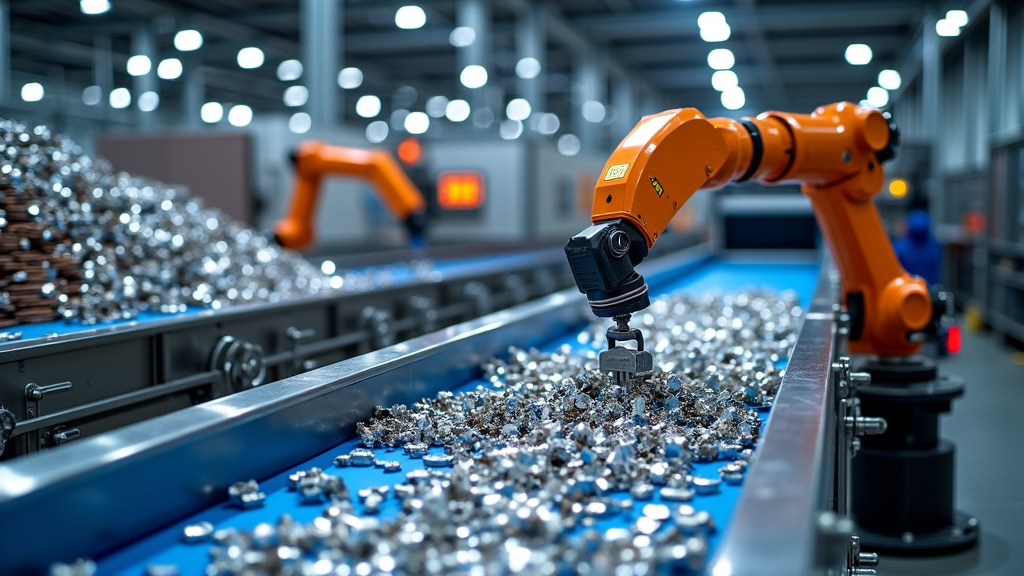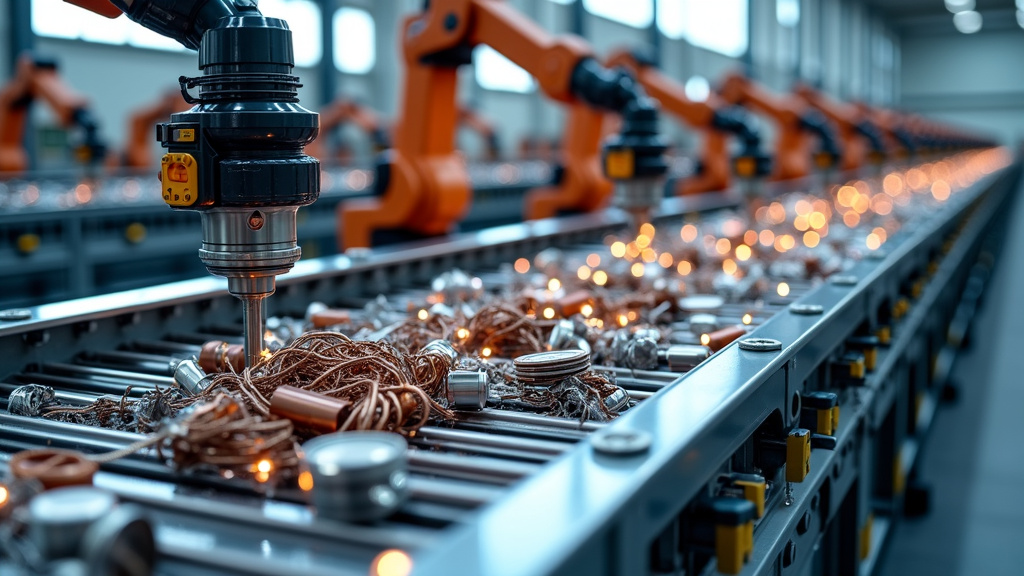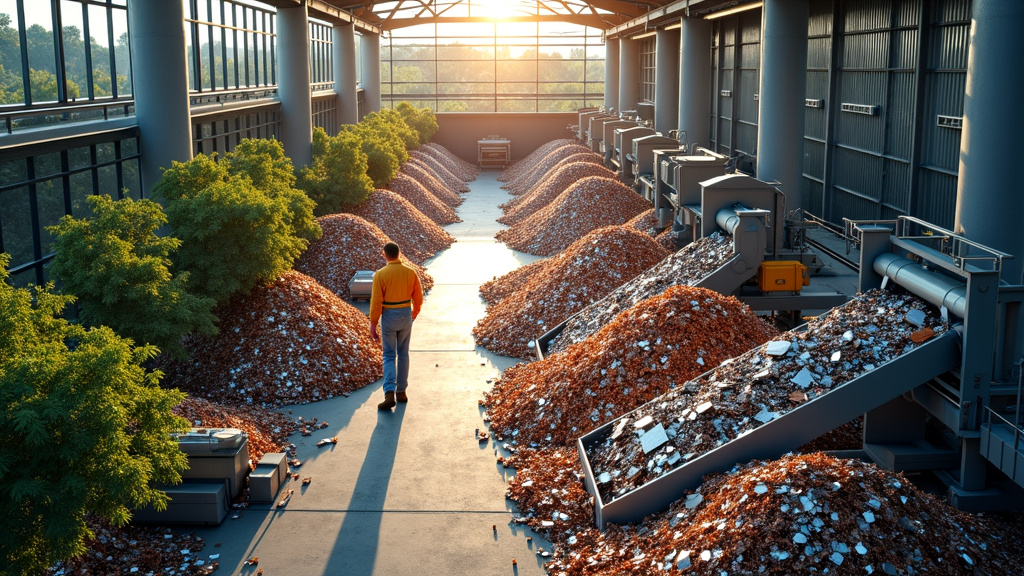5901 Botham Jean Blvd, Dallas, TX 75215
Learn About Specialty Metal Waste Collection Services
February 21, 2025Did you know that over 50 million tons of valuable metal waste end up in landfills each year? As industries evolve, the need for efficient waste management becomes increasingly urgent. Specialty metal waste collection services have become vital to sustainability efforts, transforming discarded metals into valuable resources.
Imagine a world where every scrap of metal finds new life, turning industrial waste into raw material for future innovations. This vision is becoming a reality through companies like Okon Recycling, which offer innovative recycling solutions. For industries aiming to optimize recycling and reduce their environmental impact, these services provide crucial support.
Why should businesses care about metal waste collection? It’s simple: sustainability meets profitability. By partnering with expert recyclers, companies conserve natural resources, reduce energy consumption, and unlock potential cost savings and new revenue streams. It’s a win-win situation that industry leaders are recognizing.
As we explore specialty metal waste collection, we’ll examine how these services are transforming industrial waste management, the technologies driving the field, and the tangible benefits for businesses. Whether you’re a small workshop or a large manufacturer, understanding metal recycling can enhance your sustainability practices and financial performance.
Discover how metal waste can become a goldmine of opportunity. Welcome to the future of industrial recycling, where every scrap counts, and sustainability is the key to success.
Optimizing Metal Recycling Methods

The metal recycling industry is transforming due to advanced technologies and innovative processes. Specialty metal waste collection services have become essential, allowing businesses to enhance their recycling processes and adopt sustainable practices. By implementing efficient scrap handling techniques and integrating cutting-edge sorting technologies, companies can maximize resource recovery and minimize environmental impact.
A key strategy in optimizing metal recycling is adopting advanced sorting technologies. For instance, REDWAVE’s XRF sorting system with Spectral Analysis significantly advances metal separation. This technology enables precise identification and sorting of various aluminum alloys, improving material purity and recycling quality. The system’s flexibility allows for the separation of heavy metals, stainless steel alloys, and aluminum alloys using a single machine, reducing operational costs and increasing processing speed.
Efficient scrap handling is crucial for optimizing metal recycling methods. Automated systems for material handling can significantly reduce processing time and improve worker safety. For example, robotic arms equipped with advanced sensors and artificial intelligence algorithms can quickly identify and sort different types of metals on conveyor belts, minimizing human error and increasing throughput.
Benefits of Advanced Recycling Technologies
Integrating advanced technologies in metal recycling offers numerous benefits for businesses and the environment. Improved sorting accuracy leads to higher quality recycled materials, which can command premium prices in the market. This not only increases profitability for recycling companies but also encourages more widespread adoption of recycling practices.
Furthermore, advanced recycling technologies contribute to resource conservation and reduced environmental impact. By enabling more efficient recovery of valuable metals, these technologies help decrease the demand for primary metal production, which is often energy-intensive and environmentally damaging. Recycling aluminum requires only about 5% of the energy needed to produce primary aluminum, resulting in significant carbon emissions reductions.
| Metal Type | Primary Production Energy Use | Recycled Production Energy Use | Energy Savings |
|---|---|---|---|
| Aluminum | 186 GJ/tonne | 5% of primary energy | 95% |
| Steel | 10 times more than recycled | 74% |
Adopting innovative recycling methods supports the circular economy model. By maximizing the recovery and reuse of metals, businesses can help close the loop in material flows, reducing waste and conserving natural resources. This approach aligns with global sustainability goals and enhances companies’ environmental credentials, potentially opening up new market opportunities.
Practical Implementation Strategies
For businesses looking to optimize their metal recycling methods, several practical strategies can be implemented. Investing in employee training programs to familiarize staff with new technologies and best practices in scrap handling is crucial. This ensures that advanced equipment is utilized effectively and safely, maximizing the benefits of technological investments.
Collaborating with specialized metal waste collection services can also significantly improve recycling efficiency. These services often have expertise in handling diverse types of metal waste and can provide tailored solutions for different industries. By partnering with such services, businesses can ensure that their metal waste is properly segregated and prepared for recycling, enhancing the overall efficiency of the recycling process.
Additionally, implementing data analytics and IoT (Internet of Things) technologies can provide valuable insights into the recycling process. Real-time monitoring of sorting and processing operations allows for quick adjustments to improve efficiency and quality. For example, TOMRA Insight, a data platform for sorting facilities, collects data directly from sorting systems, enabling operators to continuously optimize their processes.
In summary, optimizing metal recycling methods through advanced technologies and efficient waste management practices is crucial for building a sustainable future. By embracing these innovations, businesses can improve their operational efficiency and profitability while playing a significant role in conserving resources and reducing environmental impact. As the industry evolves, integrating these advanced methods will be key to meeting the growing demand for recycled metals and supporting global sustainability efforts.
Challenges and Opportunities in Metal Waste Management

The metal waste management industry is at a critical point, facing significant hurdles while also encountering promising avenues for growth and innovation. As regulatory pressures increase and economic considerations intensify, industry players must navigate a complex landscape to ensure both compliance and profitability.
One of the main challenges in metal waste management is the changing regulatory environment. Companies must stay vigilant to adapt to new compliance requirements that vary across regions and jurisdictions. This regulatory maze can be particularly daunting for smaller operations with limited resources.
Cost efficiency is another significant hurdle. The process of collecting, sorting, and recycling metal waste involves substantial operational expenses. Fluctuations in metal prices on the global market can further complicate the economic viability of recycling efforts, making it challenging to maintain consistent profitability.
Technological Advancements: A Game Changer
Despite these challenges, the metal waste management sector is ripe with opportunities, particularly in technological innovation. Cutting-edge solutions are emerging that promise to transform the industry’s approach to recycling and sustainability.
Advanced sorting technologies, such as AI-powered robotic systems, are enhancing the efficiency and accuracy of metal waste separation. These innovations not only improve the quality of recycled materials but also significantly reduce labor costs and processing times.
| Aspect | Traditional Sorting | AI-Powered Sorting |
|---|---|---|
| Data Handling | Limited by data size and complexity | Excels at processing large, complex datasets |
| Speed and Efficiency | Time-consuming and resource-intensive | Analyzes data quickly and efficiently |
| Insight Discovery | May miss subtle insights | Uncovers hidden patterns and relationships |
| Adaptability | Less flexible and adaptable to rapid changes | Adapts quickly to new data and evolving requirements |
Moreover, novel recycling strategies are opening up new possibilities for resource recovery. Hydrometallurgical processes, for instance, offer a more environmentally friendly alternative to traditional smelting methods, enabling the extraction of valuable metals from complex waste streams with lower energy consumption and reduced emissions.
Embracing Sustainability for Future Growth
The push towards sustainability presents both a challenge and an opportunity for the metal waste management industry. As global awareness of environmental issues grows, there’s increasing pressure on companies to adopt more sustainable practices. However, this shift also creates new markets and revenue streams for those willing to innovate.
Circular economy principles are gaining traction, encouraging the development of closed-loop systems where metal waste is viewed not as a problem but as a valuable resource. This paradigm shift is driving collaboration between waste management companies, manufacturers, and technology providers to create more efficient and sustainable metal lifecycle management solutions.
In summary, while the metal waste management industry faces significant challenges, the opportunities for innovation and sustainable growth are equally substantial. By embracing technological advancements and innovative recycling strategies, companies can not only overcome current obstacles but also position themselves as leaders in the emerging circular economy.
Looking to the future, those who can adapt to regulatory changes, optimize cost efficiency, and leverage cutting-edge technologies will be best positioned to thrive in this evolving landscape. The path forward may be complex, but it’s paved with possibilities for those ready to embrace change and drive innovation in metal waste management.
Conclusion: Towards a Sustainable Future with Specialty Metal Waste Services

Specialty metal waste collection is essential for sustainability and resource conservation. Companies like Okon Recycling lead the way in advanced recycling solutions, helping industries reduce their carbon footprint while recovering valuable materials that would otherwise go to waste.
By embracing innovative recycling practices, businesses can lower energy consumption, conserve natural resources, and enhance long-term sustainability. As climate change and resource depletion accelerate, industries must take a proactive approach to waste management.
At Okon Recycling, we provide comprehensive metal waste solutions, ensuring compliance with environmental regulations while supporting the circular economy. Partner with us to turn waste into opportunity. Contact us at 214-717-4083 to explore how we can help your business achieve sustainability goals through advanced metal recycling.
